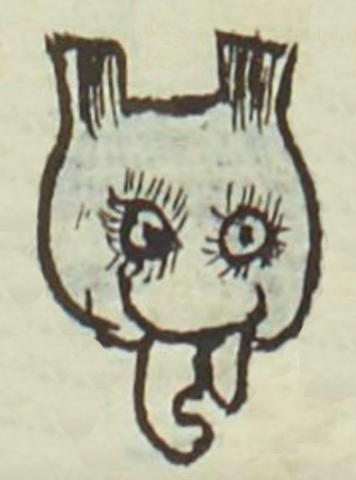Cuauhtecolotl (MH525v)
The black-line drawing of the simplex glyph for the personal name Cuauhtecolotl (here, attested as male) features the head of an owl (tecolotl) in a frontal view, which is how owls are shown at times. Perhaps the owl is merged with an eagle (cuauhtli). The eyes are open, large, round, and have short lines emanating out from them as though they shine or have sacred powers. This is seen in some glyphs as tonalli and in the eyes of one Ozoma (monkey), much like these here. (See below.) The beak is open and it seems to have a hook, but it is shown sideways, perhaps because the artist was more accustomed to drawing owls and eagles in profile. Two squared-off protrusions also come off the top of the animal's head. These are somewhat reminiscent of the ears of an owl, too. See the tecolotl from the Codex Mendoza, below.
Stephanie Wood
The squared-off shape of the ears may represent an effort by the artist to draw the devil as was becoming familiar through Christian teachings. The tlacatecolotl was often equated with a devil. The lines around the eyes could be a part of this, too, imbuing the creature with sacred powers. Note, below, how the phonetic syllable nen-, which is meant to be an "idol" (again, from Christian influence), has similar squared-off protrusions at the top of the heads.
Cuauhtecolotl, which combines two bird names, "Eagle-Owl," was a name used by some prominent men. There was, for example, a ruler in Quiahuiztlan, Tlaxcala, with the name don Baltazar Cuauhtecolotl. He is mentioned by Diego Muñoz Camargo (see the edition by Germán Vázquez, 1986, 130). A person named Cuauhtecolotl also appears in a poem from Chalco (see Miguel León Portilla, Fifteen Poets of the Aztec World, 1992, 253). Another person named Cuauhtecolotl was a steward of Ahuatepec (Tetzcoco region) (Pedro Carrasco, The Tenochca Empire of Ancient Mexico, 2012, 147). John Bierhorst wondered whether a cuauhtecolotl was a fallen warrior (see his A Nahuatl-English Dictionary and Concordance to the Cantares Mexicanos, 1985, 295).
Stephanie Wood
1560
Stephanie Wood
owls, buhos, eagles, águilas, ojos, rayos, brillar, luminosidad, lustre, fulgor

cuauh(tli), eagle, https://nahuatl.wired-humanities.org/content/cuauhtli
tecolo(tl), owl, https://nahuatl.wired-humanities.org/content/tecolotl
Águila-Buho, o Águila-Tecolote
Stephanie Wood
Matrícula de Huexotzinco, folio 525v, World Digital Library, https://www.loc.gov/resource/gdcwdl.wdl_15282/?sp=130&st=image.
This manuscript is hosted by the Library of Congress and the World Digital Library; used here with the Creative Commons, “Attribution-NonCommercial-ShareAlike 3.0 License” (CC-BY-NC-SAq 3.0).









